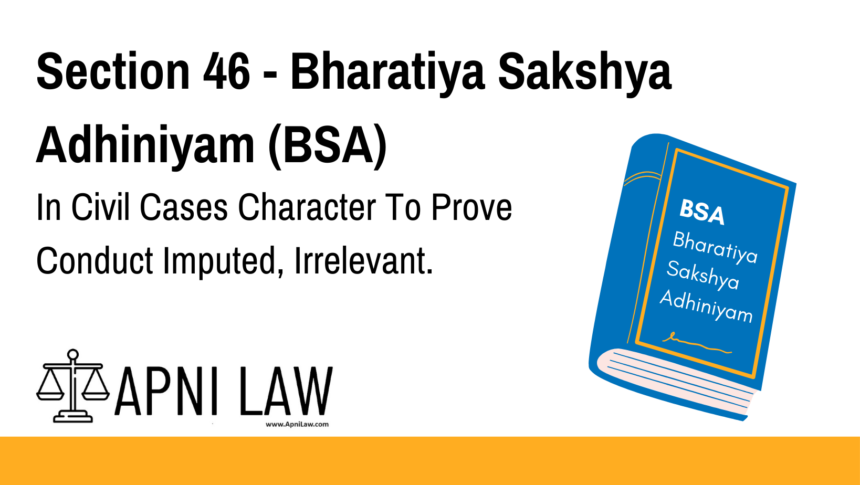Code: Section 46 BSA
In civil cases the fact that the character of any person concerned is such as to
render probable or improbable any conduct imputed to him, is irrelevant, except in so far as
such character appears from facts otherwise relevant.
Explanation of Section 46 BSA
Section 46 of the Bharatiya Sakshya Adhiniyam (BSA) addresses the relevance of a person’s character in proving conduct imputed to him in civil cases. The section establishes that, in most circumstances, a person’s character cannot be used to show that they are likely or unlikely to have acted in a particular way.
Key Provisions:
- Irrelevance of Character in Proving Conduct
The law states that a person’s character is irrelevant when trying to prove conduct in a civil case. In other words, you cannot assume that a person’s character will make certain actions more probable or improbable. - Exception: Relevant Facts
However, there is an exception: If a person’s character appears from other relevant facts in the case, it may be considered. For instance, if the character is linked to an event or fact that is relevant to the case, it can be taken into account.
Illustration
Example 1: Irrelevant Use of Character
In a civil case concerning a contract dispute, the fact that one party is known to be a “dishonest person” cannot be used to argue that they are more likely to have broken the contract. This fact about their character is irrelevant unless there are other relevant facts that directly connect their character to the breach of the contract.
Example 2: Relevant Character Evidence
If a person’s character is directly relevant to the case—for example, if their reputation for honesty is central to a fraud case—the court may allow evidence of their character, but only if it is connected to a relevant fact in the case.
Common Questions and Answers on Section 46 BSA
- Can I use someone’s bad character to prove they did something wrong in a civil case?
- Generally, no. A person’s character cannot be used to prove that they did something wrong. It is irrelevant unless it is directly linked to a relevant fact in the case.
- What if the character of a person is part of another relevant fact?
- If the character appears through other relevant facts, then it may be considered by the court. For example, if a person’s character is directly tied to a fact that is important in the case.
- Does this apply to criminal cases as well?
- No, this section applies specifically to civil cases. Different rules apply in criminal cases, where a person’s character can sometimes be considered.
Conclusion
Section 46 of the Bharatiya Sakshya Adhiniyam (BSA) ensures that a person’s character is generally irrelevant in proving conduct in civil cases. It prevents character evidence from being used improperly to infer the likelihood of someone’s behavior. However, if the character is connected to other relevant facts, it may still be admissible.
For more detailed information on legal provisions, visit ApniLaw.








